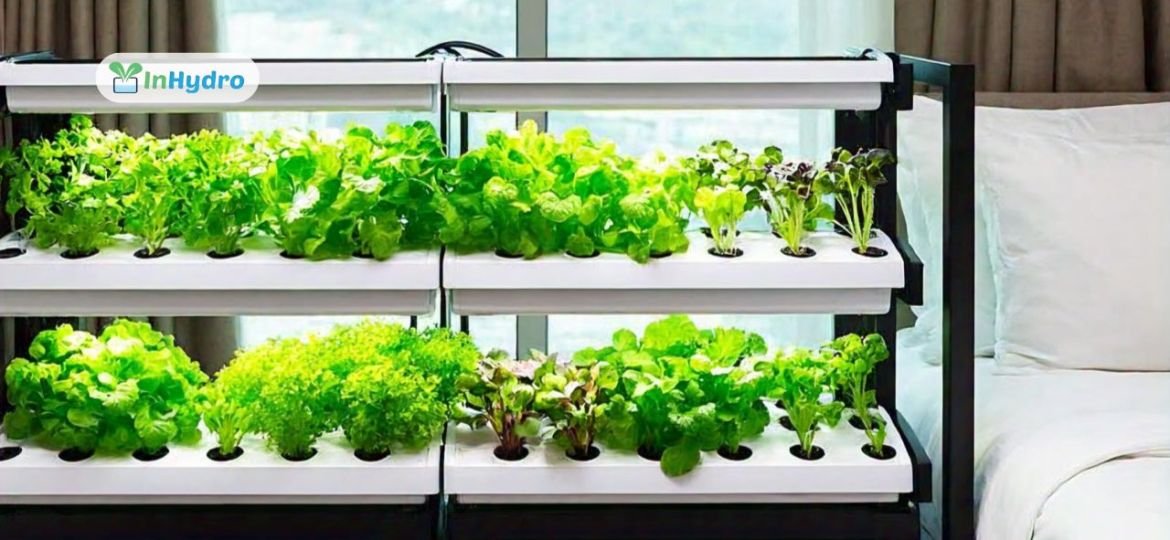
Hydroponics as a Marketing Edge for Eco-Conscious Hotels
In the competitive world of hospitality, eco-conscious travelers are seeking out hotels that not only promise luxury but also make strides in sustainability. One effective way hotels can meet this growing demand is by adopting hydroponics as part of their green initiatives. At InHydro, we recognize the power of hydroponics in transforming hotel operations and marketing strategies. By integrating this innovative farming method, hotels can stand out as environmentally responsible, offer guests fresh and pesticide-free produce, and promote their commitment to sustainability.
Hydroponics is a method of growing plants in a soil-free environment, using a nutrient-rich solution to nourish them. We’ve already covered the basics of hydroponics in our previous articles, and you can refer to them for detailed information. Here, we’ll focus on the marketing advantages and how it can be leveraged by eco-conscious hotels.
Why Hydroponics is the Future of Eco-Friendly Hospitality
Hotels are increasingly turning to hydroponics for a variety of reasons. This sustainable farming technique offers numerous benefits that align with the values of today’s environmentally-conscious travelers:
1. Fresh, Locally Grown Produce for Guests
By incorporating hydroponic farming, hotels can grow fresh herbs, vegetables, and fruits on-site. This provides guests with locally-sourced, seasonal produce that enhances their dining experience. Offering chemical-free, pesticide-free food can be a strong selling point for health-conscious guests.
- Locally Grown: No transportation emissions are involved, reducing the carbon footprint of food.
- Fresh and Flavorful: Hydroponic produce is typically harvested closer to the time of consumption, ensuring higher nutritional value and flavor.
2. Sustainable Water Use and Resource Efficiency
Traditional farming practices are highly resource-intensive, especially in terms of water consumption. Hydroponic systems use significantly less water compared to conventional agriculture, making them ideal for hotels looking to reduce their water footprint. These systems recirculate water, further optimizing resource use.
- Water Efficiency: Hydroponics uses up to 90% less water than soil-based farming, reducing the hotel’s overall water consumption.
- Sustainability: The eco-friendly nature of hydroponic farming complements a hotel’s broader sustainability goals.
3. Creating a Green Image and Attracting Eco-Conscious Guests
With growing awareness of environmental issues, more travelers are prioritizing sustainability when choosing accommodations. Hydroponics can enhance a hotel’s brand as an eco-friendly establishment, making it more appealing to eco-conscious guests.
- Eco-Friendly Marketing: Showcase your hydroponic garden in marketing materials to highlight your commitment to sustainability.
- Brand Differentiation: Stand out from competitors by offering unique green initiatives, like in-house grown produce.
4. Providing Unique Guest Experiences
Hydroponics also offers the opportunity to create memorable experiences for guests. Hotels can organize tours of their hydroponic gardens, offer cooking classes using their own fresh produce, or even allow guests to pick herbs and vegetables themselves. These interactive activities increase guest engagement and satisfaction.
- Interactive Experience: Guests can explore how their meals are grown, making their stay more memorable.
- Wellness Tourism: Combine hydroponics with wellness offerings such as farm-to-table meals, herbal treatments, or yoga retreats.
How Hydroponics Enhances Hotel Marketing Strategies
1. Positive Media Exposure
Hotels that embrace innovative, sustainable practices such as hydroponics often receive positive press coverage. Media outlets, sustainability influencers, and bloggers love to feature hotels with green initiatives, offering you free publicity and exposure.
2. Attracting a Sustainable Travel Audience
As the travel industry continues to shift toward sustainability, hotels with hydroponic systems are more likely to attract eco-conscious travelers who prefer accommodations with a reduced environmental impact. According to a study by Booking.com, nearly 70% of global travelers say they are more likely to choose sustainable travel options.
3. Strengthening Guest Loyalty
Sustainability-focused guests appreciate hotels that share their values. By integrating hydroponics, hotels can build brand loyalty and increase repeat visits. Guests who value sustainability are more likely to return to hotels that actively promote green practices.
How to Implement Hydroponics in Your Hotel
Adopting hydroponics in your hotel operations is easier than it sounds, and it can be done in steps to fit your space and budget. Here’s how to get started:
1. Choose the Right Space for Your Hydroponic Garden
Find unused spaces within your hotel, such as rooftops, balconies, or underutilized rooms. Hydroponics can be installed in compact areas, allowing hotels to make use of available space even in urban environments.
2. Select the Hydroponic System that Fits Your Needs
Various hydroponic systems are available, including vertical farming, nutrient film technique (NFT), and deep water culture (DWC). The choice depends on your space, resources, and the types of plants you wish to grow.
3. Work with Hydroponic Experts
Partner with experts in hydroponics, such as InHydro, to design, install, and maintain your system. A professional team can ensure that your hydroponic garden is set up correctly and functions smoothly, providing maximum benefits.
4. Promote Your Hydroponic Garden
Once your system is up and running, promote it through your hotel’s website, social media, and other marketing channels. Highlight how the produce is grown on-site and how it contributes to your sustainability efforts.
Hydroponic systems are highly adaptable and can be set up in small spaces, such as rooftops, balconies, or unused corners of your hotel. The system can be tailored to fit your available space.
Hydroponics reduces the use of water and eliminates the need for pesticides and harmful chemicals. It also eliminates the carbon footprint associated with transporting produce from farms to hotels.
You can grow a variety of herbs, vegetables, and even fruits using hydroponics. Common crops include basil, mint, lettuce, tomatoes, and cucumbers. The system can be customized depending on the crops you wish to cultivate.
Conclusion:
Incorporating hydroponics into hotel operations not only aligns with sustainability goals but also offers a competitive marketing advantage. By growing fresh, pesticide-free produce on-site, hotels can reduce their environmental impact while providing unique, eco-friendly experiences for guests. Hydroponics is a key innovation that hotels can leverage to meet the demands of eco-conscious travelers and enhance their brand image as a green leader in the hospitality industry.

